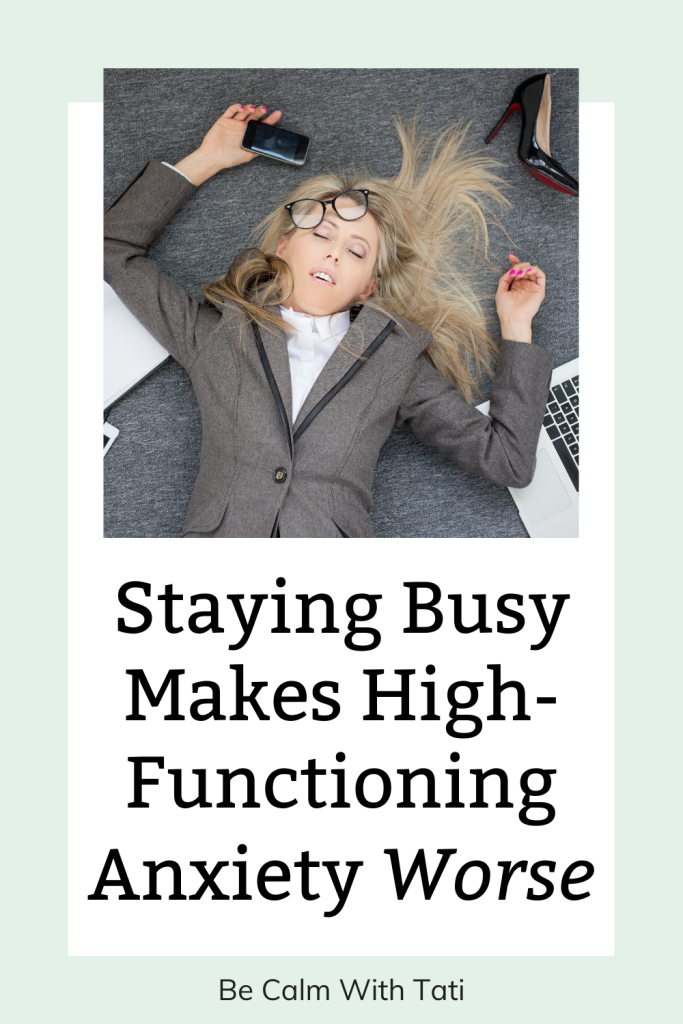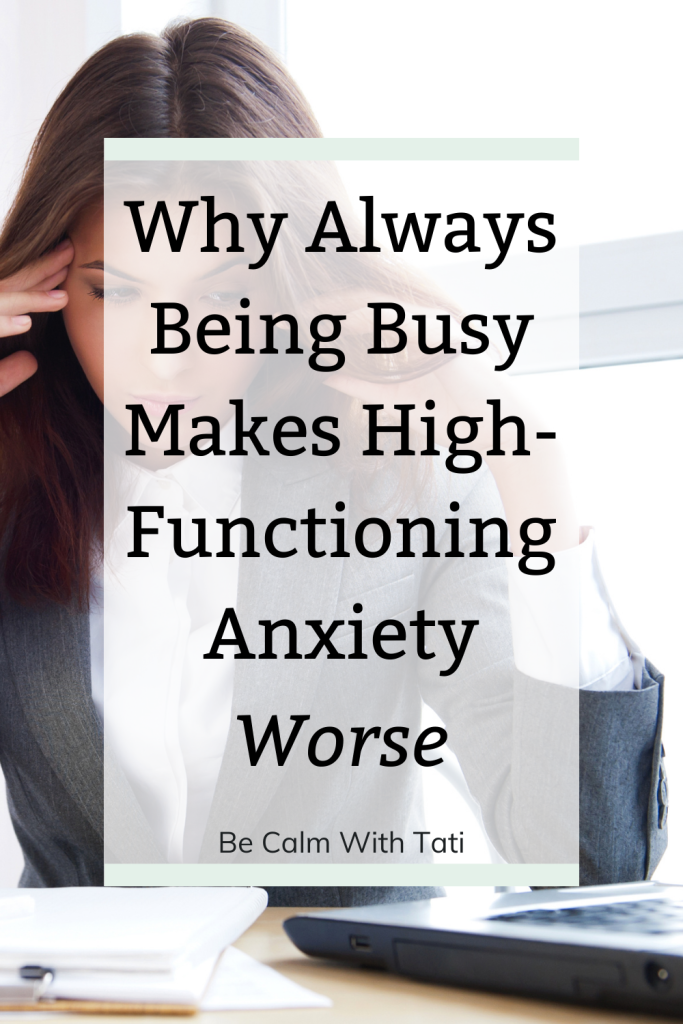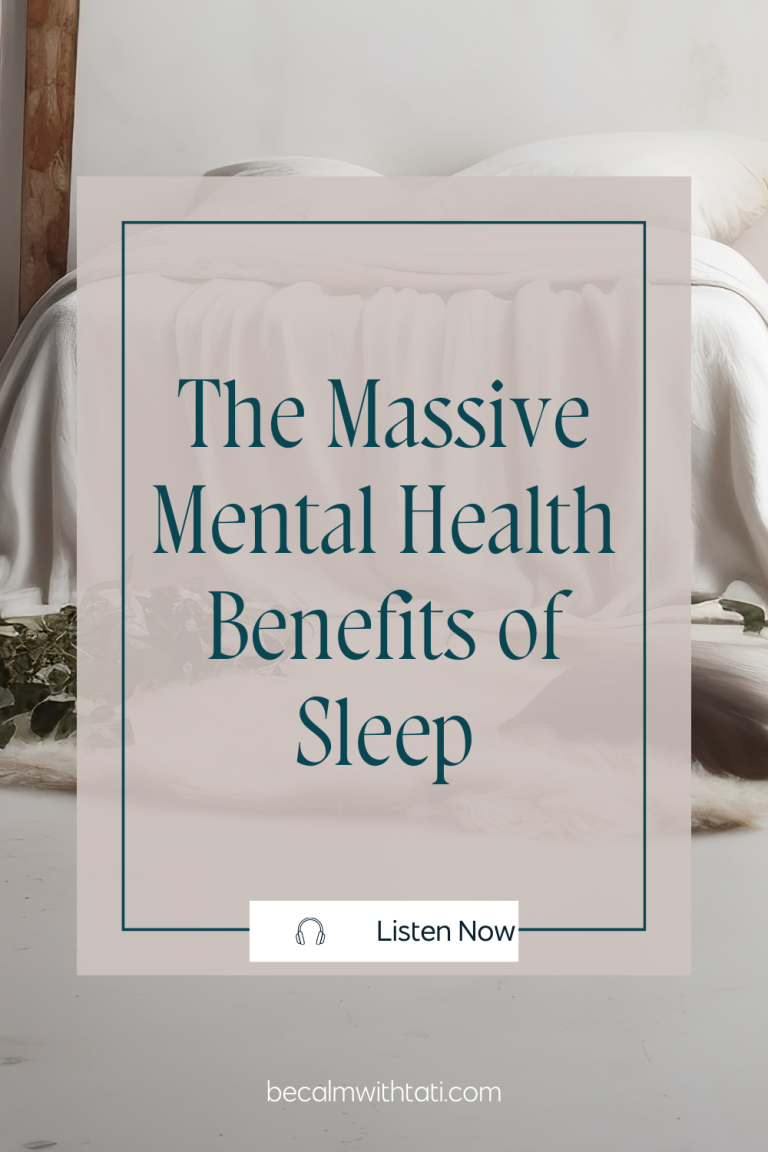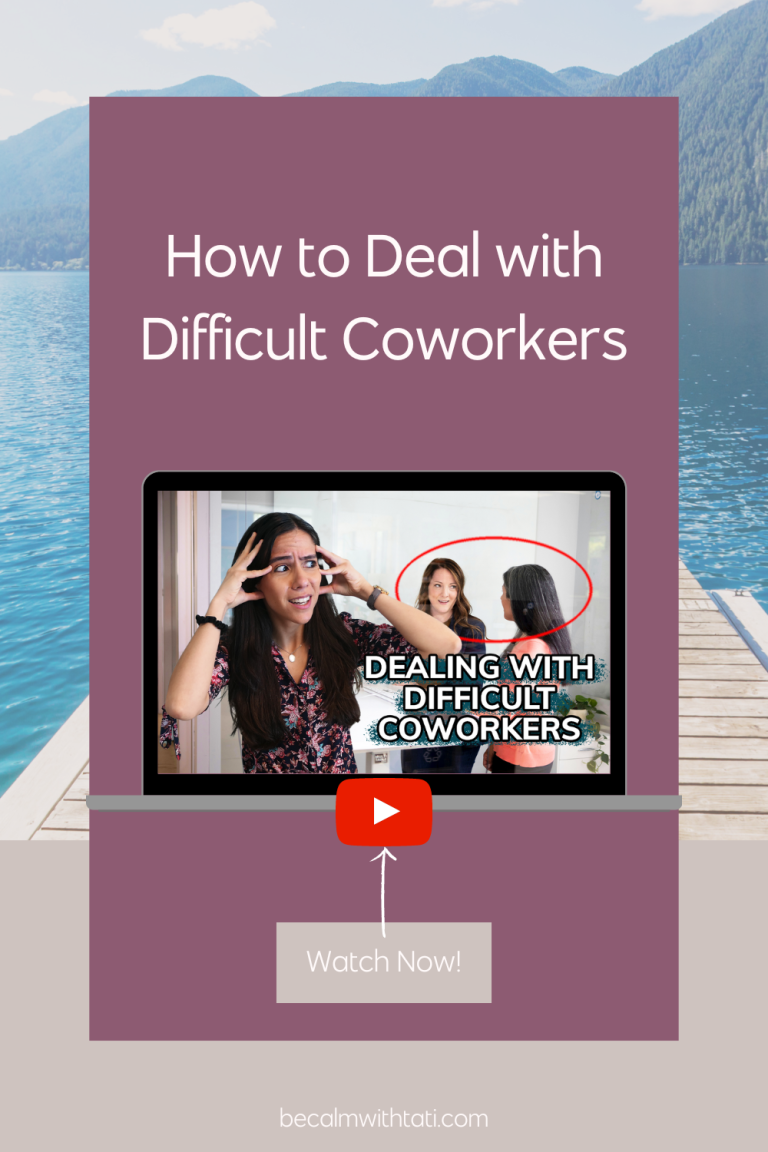High-functioning anxiety can make it difficult to relax because of all of the thoughts constantly swirling through your mind, and you might feel a drive to always be busy because you want to achieve more and be successful. Although this desire to be busy can result in high-achievement and success, it can turn into a double-edged sword if you aren’t taking the time to properly rest and take care of your mental health.
I was recently asked an excellent question pertaining to busyness and overworking when it comes to high-functioning anxiety.
Araceli asked, “In most entrepreneurial circles, and really any high achievers’ circles, there is a culture of burning the candle at both ends (waking up early and staying up late to work on your goal, working as hard as you can in the beginning, don’t take days off just take hours off, etc). How should those with high-functioning anxiety approach this concept? Should we focus on getting better first and then going full-out on our goals? Or is there a balance between the two?”
I think this is something that many entrepreneurs and high-achievers in general struggle with. The pressure between wanting to work hard in order to achieve success, and knowing when it’s okay to rest and take time for yourself.
Therefore, I want to approach this question one topic at a time.

How Does Hustle Culture And Always Being Busy Affect You When You Have High-Functioning Anxiety?
Let’s look at what hustle culture and always being busy looks like. Araceli gave a few examples of waking up early and staying up late to work on your goal, working as hard as you can in the beginning, and not taking days off, just taking hours off. In practice, this can mean spending time always doing and working and always being busy.
You might wake up in the morning, immediately grab your cell phone and check email and social media, then jump right into work for the day and continue grinding until you’re forced to eat or go to the bathroom. You might be taking minimal breaks during the day and focusing on just getting things done, whether it has to do with work, personal responsibilities, or chores. By the time you’ve reached the end of the day you have no motivation or drive to do anything except veg out on the couch mindlessly binge-watching shows until you pass out in front of the TV.
Rinse and repeat.
Societal Expectations And High-Functioning Anxiety
Society glorifies the person who keeps pushing and works hard to “make it to the top.” It builds on this idea that if you just work hard enough, then you can achieve success. On top of that, there is also the belief that if your schedule is not full and if you’re not constantly busy, then you must not be important or you must be lazy.
Self-worth has become interchangeable with how busy your schedule is, how important your job seems, and how much money you’re making. This might leave you feeling as though you are never busy enough, or successful enough, or accomplishing enough to meet your (or society’s) expectations.
These are just normal cultural pressures and expectations. Now when we add your struggles with high-functioning anxiety that can mean that you might be more sensitive to these unrealistic expectations and fear that if you don’t do things this way, then everything will fall apart.
High-functioning anxiety might result in you mentally amplifying the negative consequences that could occur if you don’t feel busy, leaving you feeling trapped in a cycle where you have to be busy in order to avoid failure or disaster. And that’s what anxiety does, it results in you thinking of the worst-case scenario in situations and doing whatever you can to prevent them from happening.
High-functioning anxiety can also result in you putting unrealistic expectations on yourself already, aiming for perfection and focusing on continuing to do and stay busy in order to feel a sense of control.

Busyness And High-Functioning Anxiety
How does the act of always being busy influence you when you have high-functioning anxiety? By the title of this episode, you might have guessed that it makes things worse.
That’s because when you are constantly busy, you are not taking time for yourself to recharge. You are a human, and contrary to popular belief, you need to rest. Sayings such as, “I’ll rest when I’m dead” or “Sleep is for the weak” are harmful and perpetuate the belief that rest is not a necessary part of being human.
You have two options:
- Work hard, hustle, and never take days off: You might be able to sustain this in the beginning, but at some point you will reach a breaking point. This might result in burnout, irritability, increased anxiety, a lack of motivation, cynicism, and dread about the future. I’ve been there. And this is what happens when you don’t take the time to stop being busy.
- Work hard and stay focused while regularly taking breaks throughout the day. Disconnecting from work and staying busy in the mornings and evenings, and allowing yourself proper time to rest and recharge by taking at least one day off from work and responsibilities per week. You will be able to sustain focused work longer, your ability to create and achieve maximum output will be increased, and you will feel better in the process.
So why exactly does always being busy make high-functioning anxiety worse? That’s because you might be more sensitive to external triggers and when you push through and continue to work, you are probably ignoring your body’s signals. These signals might be telling you that you need to process and work through your emotions, or care for your mental or physical health in some other way.
Anxiety and stress increase when you are not listening to your needs, never feel like you can take a break, and have way too many external inputs (such as work, constantly learning new things, filling every empty moment with checking email or social media, etc.) and no outputs to allow you to reflect and process what is going on within you.
Staying busy prevents you from confronting your thoughts and emotions, which will just end up building up over time, especially when you struggle with high-functioning anxiety.
So what can you do about it?
What Is The Best Approach For Those With High-Functioning Anxiety?
How should those with high-functioning anxiety approach this concept? Should we focus on getting better first and then going full-out on our goals? Or is there a balance between the two?
Many people say that work-life balance is a myth, and I wholeheartedly disagree. I believe that balance is an integral and essential part of life as a whole, and that the systems in our body and in our world are constantly in flux as a way of creating balance. For example, your body temperature is a way that your body attempts to maintain balance and equilibrium to keep you healthy. You start to sweat when your body temperature increases, and your muscles start to shiver as a way of increasing body temperature when you get too cold.
In a similar way, it is important to maintain balance when it comes to the time you devote to busyness, or work, and relaxation. At the same time, perfect balance is impossible. Our lives go through different seasons and phases where one thing may take priority over another, and that’s okay.

Here are my 4 tips to help you manage busyness when you have high-functioning anxiety:
1. It is perfectly okay to take periods of time to work hard.
It is perfectly okay to take periods of time to work hard, especially at the beginning stages of building a business or any other important project or goal in your life. Be aware of your self-talk when you are working hard, and remember to focus on your wins and the progress you are making, not the negatives and everything you haven’t done! This will help you feel better and more motivated to keep going.
2. Ensure that you are balancing these periods of working hard with periods of rest.
Ensure that you are balancing these periods of working hard with periods of rest. It is best to regularly integrate periods of rest so that you can feel fully recharged to bring your best foot forward. This can mean taking a 15 minute break every 2-3 hours, resting in the morning and evening, and taking one day per week completely off from work.
3. Be kind to yourself if you are caught in a period of busyness and working a lot.
Be kind to yourself if you are caught in a period of busyness and working a lot. This happens to me, I make it a point to listen to what my gut is telling me, and sometimes my gut tells me that I’m experiencing a burst of creativity so I keep working into the night and weekend. But I make sure to allow myself time to recover once I have gone through this period. The important part is to allow yourself to rest, but also not to beat yourself up if you do not feel that you have rested “enough.” Accept the reality of where you are right now, without fixating on the past and what you cannot change.
4. Build non-negotiables into your daily routine.
Build non-negotiables into your daily routine. I like to call these “baseline habits” that you must do in order to feel your best and as though you are caring for your mental and physical health. Right now my baseline habits are exercise, journaling, reading, and meditation. Some other examples might include getting a full night of sleep, going for an afternoon walk, drinking plenty of water, or tracking your mood daily with an app like Daylio. Make a list of your non-negotiables and work them into your routine, regardless of how busy you are.
There is no perfect recipe to achieving your goals. The most important part is to recognize that you are doing things your way and that means listening to yourself and your needs. That will ensure that you are not only doing your best work, but also taking care of your mental health so you can feel better in the process.
Your action tip is to take these tips I’ve shared and put them into action, because nothing changes if you don’t change! Recognize your current priorities in life, and remember that you can’t do it all at once, and that’s okay.
I’d love to hear your thoughts on high-functioning anxiety, hustle culture, and busyness. Leave a comment below letting me know your thoughts!















